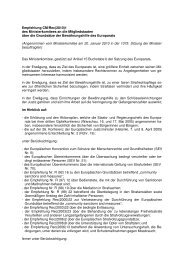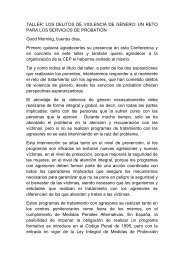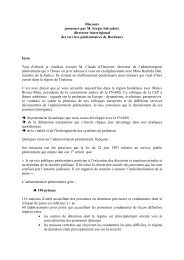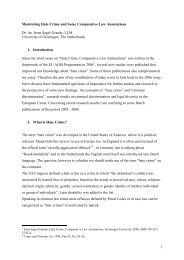Report EM 2005 - E - CEP, the European Organisation for Probation
Report EM 2005 - E - CEP, the European Organisation for Probation
Report EM 2005 - E - CEP, the European Organisation for Probation
Create successful ePaper yourself
Turn your PDF publications into a flip-book with our unique Google optimized e-Paper software.
5.5 Analysing net-widening in <strong>the</strong> context of electronic monitoring<br />
Markus Mayer<br />
Participants noted that net-widening was an important issue and was discussed by<br />
probation services in all countries. But it was also difficult to identify net-widening, and<br />
to compare <strong>the</strong> problem in different legal systems. Never<strong>the</strong>less, it was commonly<br />
agreed that net-widening was more likely in front-door than in back-door programmes.<br />
Some participants commented that judges were sometimes tempted to use electronic<br />
monitoring in a net-widening way. Judges obviously also anticipated <strong>the</strong> consequences of<br />
<strong>the</strong>ir judgment and sometimes gave higher sentences in order to prevent <strong>the</strong> use of<br />
electronic monitoring.<br />
The phenomenon of net-widening was also discussed in <strong>the</strong> wider context of general<br />
changes in social control. Participants stated that while <strong>the</strong> quantity of crime had not<br />
changed very much in recent years, <strong>the</strong> response to criminal offences had changed<br />
considerably.<br />
There were some slight differences in <strong>the</strong> points of view expressed in <strong>the</strong> workshop, but<br />
<strong>the</strong>se were related to differences in legal systems or in <strong>the</strong> implementation of electronic<br />
monitoring in different countries.<br />
As <strong>the</strong>re was little or no empirical research on net-widening in <strong>the</strong> countries represented<br />
in <strong>the</strong> workshop (Switzerland, France, Belgium, Spain, Portugal, and Germany), <strong>the</strong><br />
views of participants relied mostly on personal experience.<br />
The most important outcome <strong>for</strong> <strong>the</strong> participants was an awareness of <strong>the</strong> different ways<br />
of implementing electronic monitoring and <strong>the</strong> difficulties concerning net-widening that<br />
related to each kind of implementation.<br />
It was agreed that it was important <strong>for</strong> practitioners to continue discussing <strong>the</strong><br />
differences in <strong>the</strong> use of electronic monitoring. Such discussions would continue to throw<br />
up important questions which could in <strong>the</strong> end produce a more conscious and reflective<br />
use of electronic monitoring.<br />
5.6 Electronic monitoring and social supervision<br />
Elisabeth Gabella / Annie Kensey<br />
Participants looked at <strong>the</strong> French electronic monitoring system from <strong>the</strong> point of view of<br />
<strong>the</strong> social worker. They were strongly of <strong>the</strong> view that electronic monitoring should<br />
always be combined with social supervision as provided by a social worker. However,<br />
more research was needed on <strong>the</strong> effectiveness of combining electronic monitoring and<br />
social supervision in this way.<br />
Participants noted <strong>the</strong> decision to retain electronic monitoring as a function of <strong>the</strong> state<br />
in France.<br />
17


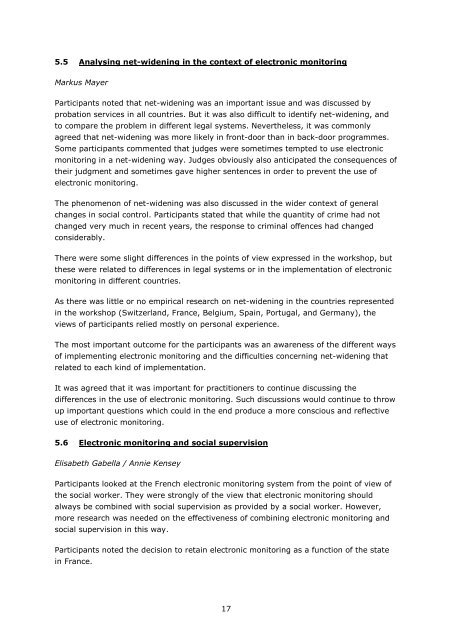

![AGIS2 Nov 08 Conference Report_[Version 2] - CEP, the European ...](https://img.yumpu.com/50764570/1/190x245/agis2-nov-08-conference-report-version-2-cep-the-european-.jpg?quality=85)
